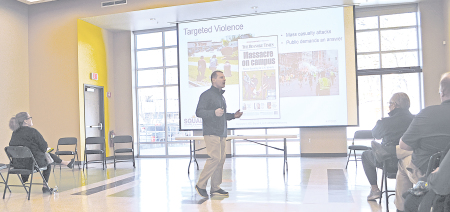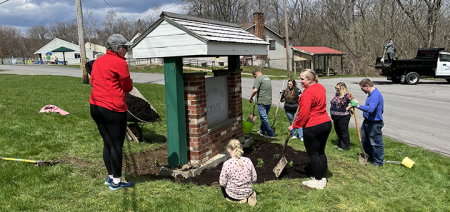Arcuri, Hanna Debate The Issues
Published:
October 21st, 2010
By:
Melissa deCordova

NORWICH – New York’s 24th Congressional District race is heating up with recent polls giving incumbent Congressman Michael Arcuri, D-Utica, a 10-point lead over his challenger, Republican businessman Richard Hanna, also of Utica.
The race is a rematch from when the two faced off in 2008, and is so far defying conservatives’ hopes for cleaning house in Congress.
Both candidates campaigned in Chenango County last night at Commerce Chenango’s Business After Hours event at Sidney Federal Credit Union’s Norwich branch. The Evening Sun compiled a list of five questions that concern the local population. Here are Arcuri and Hanna’s responses:
Agro Farma is projecting exponential increases in the quantity of local milk they will need to keep up with demand for their Chobani-brand Greek-style yogurt, yet area dairy farmers are still struggling to get by on farm gate milk prices which are below the cost of production. What do you propose in both the short and long term to address the challenges the dairy industry is facing?
Arcuri: Dairy farmers have been hit hard by an unstable market and rising costs. These problems affect all of us - dairy farming is one of our area’s largest industries. In the short term, we need to make sure to keep production costs down. That’s why I cosponsored legislation to transfer the cost of transporting milk from the farmer to the processor, introduced provisions into the 2008 Farm Bill making support payments to dairy farmers account for increasing feed costs, and voted to increase the milk income support payment rate to 45 percent. But in the long term, we have to tackle the unstable dairy market. That’s why I’ve cosponsored the Dairy Price Stabilization Act which would co-align supply and demand. Under this program, individual dairy farms would have the choice of either maintaining their current production level or expanding their production and increasing their share of the market.
Hanna: My priority for the dairy industry would be to create true price discovery and market transparency. It should be mandatory for milk processors to report electronically daily milk production and manufactured dairy products in inventory. Furthermore, there is a study due at the end of the year and we should consider those findings to reform the federal milk marketing orders, which would include consolidating classes of milk to two: the first class would be for fluid and the second class would be for all other manufactured dairy products.
It appears that the Dairy Price Stabilization Act would create additional oversight and bureaucracy within USDA, which I do not think is necessary. In Congress, I would seek an assignment on the Agriculture Committee and have input on the Farm Bill reauthorization.
On the issue of hydrofracturing shale formations to extract natural gas, do you feel the federal Environmental Protection Agency should regulate energy companies under the Safe Drinking Water Act or would you leave regulating the exploration and development of natural gas in New York up to the state’s Department of Environmental Conservation?
Hanna: I welcome the EPA’s study on hydraulic fracturing and am interested in the results. It’s a benefit the EPA is engaged since its focus is on the protection of human health and the environment, as well as the fact there are issues with cross-border contamination. But, I still believe strongly this is a state decision and the Department of Environmental Conservation should take the lead on this issue.
Arcuri: Natural gas exploration has economic potential, but we cannot move forward until we can ensure the safety and security of our fresh water supply. I think that they key is simply that somebody, whether the EPA or the DEC, knows what chemicals are being used so that they can know what to do in the event of an accident. That’s just common sense. I co-sponsored legislation, the Fracturing Responsibility and Awareness of Chemical (FRAC) Act, to repeal the exemption from the Safe Drinking Water Act for the oil and gas industry and require disclosure by companies of the chemicals they use for hydraulic fracturing. Under this legislation, gas companies would have to disclose the chemicals they use to the state administrators like the DEC, but again, the key is simply that an agency with the ability to handle an accident knows what they’re dealing with.
Public employees for the last 10 years have been the highest category of wage earner in Chenango County. In next year’s budget, taxpayers will have to afford $1 million more for employees in the state’s retirement system and $1 million more for health coverage. What will you do at the federal level to help our county’s population, most of whom are elderly and recipients of social security, afford these costs?
Arcuri: We need to take all steps to keep down the middle class tax burden. I support extending ALL of the 2001 and 2003 federal tax cuts. We also need to take steps to keep local taxpayers from having to shoulder the cost of vital services and projects. That’s why I supported the Stimulus Bill, which included $6.5 million to keep prevent teacher lay-offs in Chenango County school districts and $2 million in loan forgiveness for Chenango County sewer repairs. Without these actions, local taxpayers would have suffered rate hikes.
I’ll also continue to oppose any plan to privatize social security, and I’m working to see that benefits keep up with the cost of living. While the indicators the government uses may say the cost of living index did not rise, the cost of medicine, among other things, did. I helped make sure that the Stimulus Bill included a $250 payment to seniors and veterans. I’ve co-sponsored legislation to do the same this year, and I will continue the fight in to make sure folks get it.
Hanna: This isn’t an issue Congress deals with directly, but it is urgent and critical to the survival of Upstate New York that we control costs. We need to create an environment where business can grow, thrive and relocate to New York. The cost of doing business here is simply too high, which is why we see government jobs increase as the private sector decreases. The growth of government is fundamentally incompatible with the success of the private sector. Essentially, debt is a symptom of our spending disease. The only way we can secure programs like Medicare and Social Security is to rein in spending to decrease our debt. We have current account deficits of $14 trillion; if we can’t control our debt, we can’t control the viability of programs that so many rely on.
As we look at many communities in our state, we see the loss of population, high unemployment and fewer people contributing to the system. It is small businesses that will employ more people and therefore improve the general economy. On the federal level, I will support extending existing tax cuts for small businesses, farmers and working families. I also believe we need comprehensive tax reform such as eliminating the alternative minimum tax that hits middle class families and lowering the corporate tax that places our local manufacturers at a competitive disadvantage with other countries like China.
The first step is protecting local businesses and farms through less taxation and regulation and lower government spending. The second step is building a business-friendly local economy will end the flight of Upstate New York’s young adults. This district has exceptional elementary and secondary educational systems along with dozens of nearby colleges and universities. Unfortunately, our children and grandchildren cannot thrive here and thus leave for other opportunities. We must keep strong our local educational institutions and retain educated, well-trained graduates with the promise of jobs and opportunity.
On the issue of unemployment, what will you do at the federal level to encourage existing businesses to expand and create jobs and also to entice new businesses to relocate here? On Chenango County-specific issues, in what order would you rank the following:
- Encourage the New York State Department of Transportation to make needed improvements to state Route 12.
- Provide federal funding for more career-specific educational and training programs at SUNY Morrisville and BOCES.
- Call for NYS&W rail traffic through the heart of Chenango County.
- Halt the demolition of the New York State Veteran’s Home in Oxford and use that and the vacated Camp Pharsalia minimum security prison facility for an alternative, job producing use.
Hanna: The one project that will bolster all others is the improvement of access and traffic flow on state Route 12. Businesses, residents and economic development will all be affected by upgrades to the road, a main thoroughfare of Chenango County. Agro-Farma, The Raymond Corporation, Unison and The Mid-York Press Inc. would all benefit from better access and improved highways. This will grow economic development. Education also is increasingly important for us to be competitive in a global environment. We should always look for ways to expand the skills of our workforce through continued education and trades.
Arcuri: Chenango County has great examples of all of our regional strengths. Improving Route 12 has been one of my top priorities, and this year I secured almost half a million dollars to make upgrades. Safe, reliable roads create new jobs, help local businesses ship goods, and attract new businesses to the area.
Education is another one of our region’s strengths because of great schools like SUNY Morrisville. In Utica, I’ve secured funding for training programs in cybersecurity and aircraft maintenance. These kinds of programs maximize workforce development, increase job placement and ensure that our home-grown talent stays here.
I also have to point out how important it is to make sure that local manufacturers like Unison Industries have a fair shot to compete. Because many of the F-136 competitive engine’s parts are manufactured at Unison, I fought to preserve defense funding for its production. Unison is creating 50 to 75 new jobs as a result.
The federal government can and should create an environment for small businesses to create jobs and attract new businesses by building up this region’s strengths - transportation, education, agriculture, and manufacturing.
Do you think we are sending mixed signals to local law enforcement regarding the enforcement of marijuana laws with the growing cultural movement toward legalization? Where do you stand on it and where do you see New York State going with it? Would you oppose it, not oppose it or support it?
Arcuri: I am opposed to the legalization of marijuana. As a former DA, I have seen how the drug trade impacts families and communities.
Hanna: It is illegal now, so there should be no mixed signals among local law enforcement: it is the law. I’m confident our hardworking men and women are willing to enforce the law. As far as legalization, I support state’s rights and feel it is an issue left to individual states to determine.
The 24th Congressional District includes all of Chenango County, as well as Cortland, Herkimer and Seneca counties, and part of Broome, Cayuga, Oneida, Ontario, Otsego, Tioga and Tompkins counties.
Author: Melissa deCordova - More From This Author
Comments








